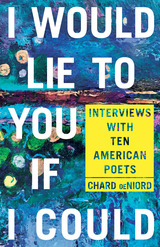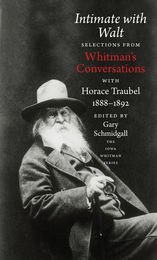3 start with I start with I

The poets testify to the demotic nature of poetry as a charged language that speaks uniquely in original voices, yet appeals universally. As individuals with their own transpersonal stories, the poets have emerged onto the national stage from very local places with news that witnesses memorably in social, personal, and political ways. They talk about their poems and development as poets self-effacingly, honestly, and insightfully, describing just how and when they were "hurt into poetry," as well as why they have pursued writing poetry as a career in which, as Robert Frost noted in his poem "Two Tramps in Mud Time," their object has become "to unite [their] avocation and [their] vocation / As [their] two eyes make one in sight."

Between 1919 and his death by suicide in 1963, Arthur Crew Inman wrote what is surely one of the fullest diaries ever kept by any American. Convinced that his bid for immortality required complete candor, he held nothing back. This abridgment of the original 155 volumes is at once autobiography, social chronicle, and an apologia addressed to unborn readers.
Into this fascinating record Inman poured memories of a privileged Atlanta childhood, disastrous prep-school years, a nervous collapse in college followed by a bizarre life of self-diagnosed invalidism. Confined to a darkened room in his Boston apartment, he lived vicariously: through newspaper advertisements he hired “talkers” to tell him the stories of their lives, and he wove their strange histories into the diary. Young women in particular fascinated him. He studied their moods, bought them clothes, fondled them, and counseled them on their love affairs. His marriage in 1923 to Evelyn Yates, the heroine of the diary, survived a series of melodramatic episodes. While reflecting on national politics, waifs and revolutions, Inman speaks directly about his fears, compulsions, fantasies, and nightmares, coaxing the reader into intimacy with him. Despite his shocking self-disclosures he emerges as an oddly impressive figure.
This compelling work is many things: a case history of a deeply troubled man; the story of a transplanted and self-conscious southerner; a historical overview of Boston illuminated with striking cityscapes; an odd sort of American social history. But chiefly it is, as Inman himself came to see, a gigantic nonfiction novel, a new literary form. As it moves inexorably toward a powerful denouement, The Inman Diary is an addictive narrative.

In Intimate with Walt Gary Schmidgall has condensed Traubel's nearly 5,000 pages into one manageable volume featuring the many self-revealing, humorous, nostalgic, and often curmudgeonly words of the Good Gray Poet. The book is divided into five sections, each consisting of several chapters: the first, presenting Walt on himself, his family, and his daily life and visitors at the only home he ever owned; the second, on his artistic credos, the literary life, and a large array of comments on the writing, publication of, and critical reaction to Leaves of Grass; the third, focusing on his friends, admirers, idols, and lovers; the fourth and longest, presenting his no-holds-barred views on a variety of topics, including the American scene, race, religion, music, and even alcohol; and finally, a gathering of passages revealing Whitman's struggles with his infirmities, his poignant final days, and Traubel's observations on Whitman's deathbed scene and burial rites.
READERS
Browse our collection.
PUBLISHERS
See BiblioVault's publisher services.
STUDENT SERVICES
Files for college accessibility offices.
UChicago Accessibility Resources
home | accessibility | search | about | contact us
BiblioVault ® 2001 - 2024
The University of Chicago Press









